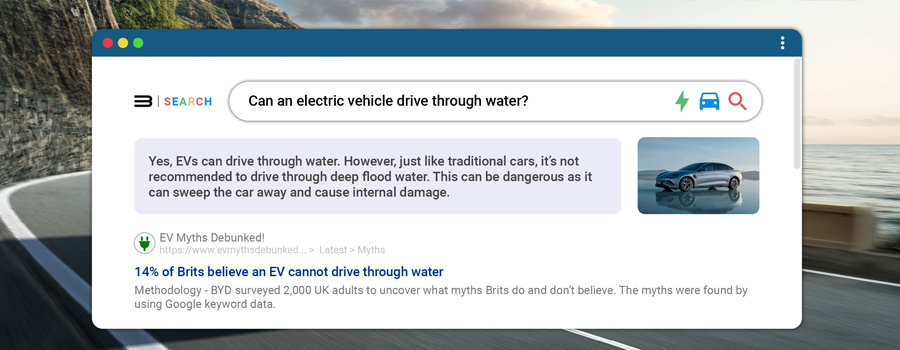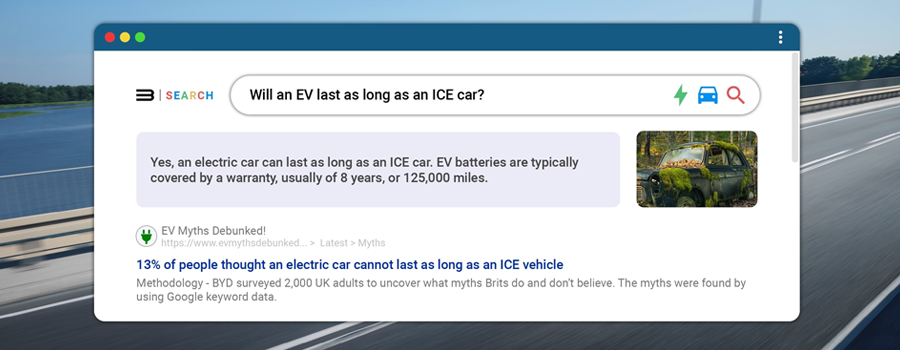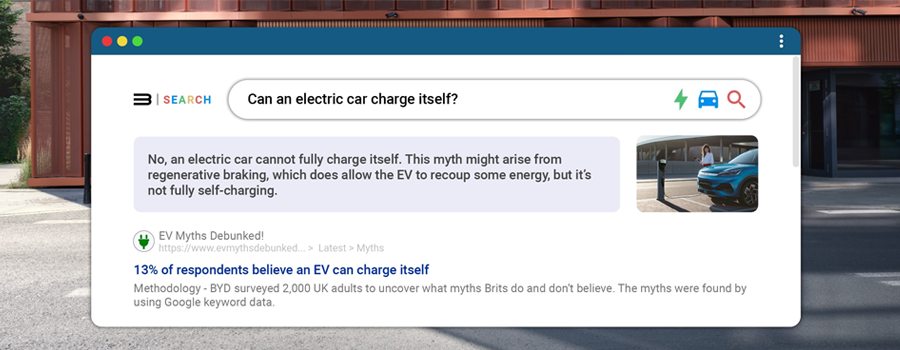Debunking the seven most common myths about EVs

It seems that no matter how long electric cars have been an everyday thing, there are some persistent myths around them that refuse to go away. The fact that we’re even describing them as ‘myths’ should be enough to tell you it’s not worth wasting your time thinking about them. Yet, with EVs shaping the future of the UK’s roads, new research from BYD reveals that myths surrounding EVs still remain prevalent across the UK.
To address these misconceptions, BYD surveyed 2,000 people in the UK to identify the most common EV myths that need a good debunking.
Chinese EV-maker, BYD Auto, may only have been around since 2003, but in that short time the brand has mastered the core technologies of electric vehicles, such as batteries, electric motors, and electronic controllers. Aiming squarely at the global transportation sector, BYD Auto focuses on developing pure electric and plug-in hybrid vehicles for a wide range of markets, including Europe.
We’ve already covered BYD’s all-electric cars in previous posts, including the Seal, Atto 3, Dolphin, and Sealion model ranges, all of which are available for you to lease right now.
In the case of this post, it’s less about the particular car and more about those lingering notions that are muddying the waters for anyone trying to decide if they should make the switch to an EV.
Older generations are the most sceptical of these myths, according to BYD’s research, with nearly nine in 10 (89%) over-55s rejecting the misconceptions. In contrast, only 17% of 18-24-year-olds and 23% of 25-34-year-olds dismissed them. Weirdly, it seems the generations that have been exposed to electric cars from an earlier age are those most likely to believe the outdated myths that surround them.
Steve Beattie, Sales and Marketing Director at BYD UK, summarised the survey results: “Our research shows that while electric vehicles are changing the way we drive, there are still a lot of misconceptions out there. Clearing up these myths is key to building trust and helping drivers feel confident about EV technology as we move towards a zero-emission future.”
BYD is aiming to debunk these myths to “accelerate the shift to sustainable mobility”. We’re quite happy to spread the debunking, not because it's a noble cause but simply because these myths are utter nonsense.
So, in the wise words of Steve...

The most widely believed myth is that you cannot take an EV charger with you when moving house, with 18% of respondents agreeing.
Steve explains: “While EV chargers are fixed to homes, they can be professionally uninstalled and reinstalled at a new address. Many people don’t realise this, but with professional help, moving a charger is straightforward. It’s worth considering the cost, though, as installation is often included with new chargers.”

Another misconception, believed by 17% of people, is that an EV can be manual.
Steve adds: “EVs are automatic by design, thanks to their consistent power delivery, which removes the need for a clutch or gearbox. They’re built for simplicity and efficiency, making them easier and smoother to drive.”

Almost one in six (14%) respondents think an EV cannot drive through water.
Steve comments: “Modern EVs are built to rigorous safety standards, with waterproofed components that allow them to drive through water just as safely as petrol or diesel cars. Whether it’s rain, puddles, or car washes, EVs are thoroughly tested for water resistance, so drivers don’t need to worry.”

One in seven (13%) people believe that EVs will not last as long as internal combustion engine (ICE) cars.
Steve explains: “EVs typically have fewer moving parts, which reduces wear and tear over time. Long warranties, like BYD’s 8 year or 125,000 mile battery guarantee, highlight their durability, and reflect manufacturers’ confidence in their longevity.”

Another 13% believe that EVs can charge themselves.
Steve clarifies: “This could be due to confusion around regenerative braking. Regenerative braking does recover energy during deceleration, but it doesn’t fully charge the battery. It’s an efficient way to extend range and improve performance, but EVs still need to be plugged in for a complete charge.”

The survey also revealed that 11% of respondents think EVs cannot be towed.
Steve adds: “EVs can be safely towed, as long as the correct method is used. Flatbed tow trucks are the safest option for any vehicle, including EVs. Dolly towing is also possible for some EVs if they can be placed in neutral gear. It’s just about using the right approach.”

Finally, 7% of people believe EVs cannot go through a car wash or get wet.
Steve reassures: “This misconception comes from concerns about water and electricity, but EVs are built to meet stringent safety standards. Rain, puddles, and car washes are perfectly safe for electric cars.”
And now you know, you don’t have to worry about leasing yourself an EV. Instead, you can now concentrate on deciding which one you fancy most.
View our latest blog posts

Categories
Pages
We are a family run business based in rural Worcestershire. Our team of 38 staff are on hand to provide an exceptional service to personal and business customers.
Read More
